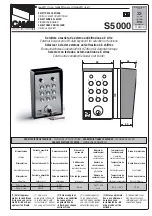
Quic
k Guide
CGP-1000 Owner’s Manual
60
Recording Your Performance as Audio (USB
Audio Recorder)
Here you’ll learn how to record your performance as audio data to a USB flash memory. For example, by connecting a
guitar, microphone or other device to the instrument, you can record an ensemble performance of guitar and keyboard
together or record yourself singing along with Song playback. The performance data is saved as a WAV file of conven-
tional CD quality (44.1 kHz/16 bit). Since it is possible to play back the file on computer, a listener doesn’t need to
have the particular instrument in order to hear the performance. This makes it possible to easily share your perfor-
mances and recordings with your friends via e-mail, record your own CDs, or upload the recordings to websites for
many others to enjoy as well.
Recording methods on the instrument include MIDI recording as well as audio recording. For details about the differ-
ence between audio and MIDI recording, see page 196. For specific instructions on MIDI recording, refer to page 200.
• When recording with the USB Audio Recorder function, make sure to use an appropriate USB flash memory device.
• In order to record your own original CD, you’ll need a CD-R drive (or compatible device). Refer to the manual that came with your
specific computer for details.
• When you attach a recorded file in an e-mail message, make sure the file size is small enough to be sent.
The following sounds can be recorded.
• Internal tone generator of the instrument.
Keyboard parts (Right 1, Right 2, Left), Song parts, Style parts
• Input from a microphone, guitar or other instrument (via the [MIC./LINE IN] jack).
• Input from another audio device, such as a CD player, MP3 player or the like (via the [MIC./LINE IN] jack).
n
Songs protected by copyright, such as preset songs, and the metronome sound cannot be recorded. Moreover, the effect of the
soundboad is not reflected in the recording.
Also, the Sustain Samples, which simulate resonance of piano strings with the damper pedal down, cannot be recorded when the
iAFC effect (page 82) is on. If you want to record the Sustain Samples, turn the iAFC effect off.
The recorded data using this function is saved as:
• Stereo WAV data
• 44.1 kHz sample rate/16 bit resolution
Recording Your Performance as Audio
Now, try recording a performance of your singing along with Song playback with a connected microphone. The maxi-
mum amount of recording time is 80 minutes, though this may differ depending on the capacity of the particular USB
flash memory.
Here, you’ll also see by example how to sing along with accompaniment/Style playback. To set the Style, go
on to step 6 (page 46).
• To record your performance by USB Audio Recorder, use the compatible USB flash memory. When the USB flash
memory is not compatible, it is not likely to be able to record/playback normally.
• Before using a USB flash memory, be sure to read “Handling the USB Storage Device (USB Flash Memory/Floppy
n
1
Set the desired Voice, etc. which you want to use for your performance, and connect
a microphone. (For information on setting the Voice, see page 28; for connecting a
microphone, see page 54.)
2
Connect the USB flash memory to the [USB TO DEVICE] terminal.
n
















































